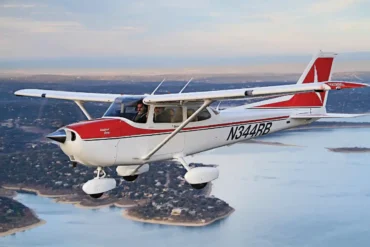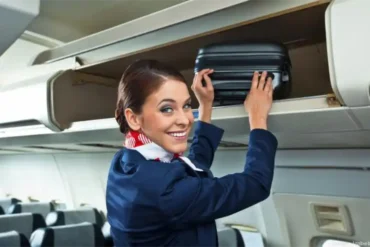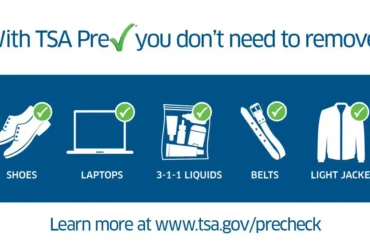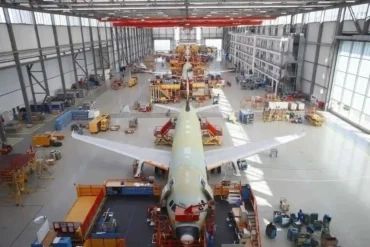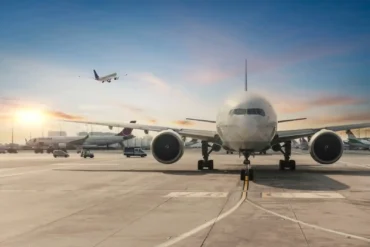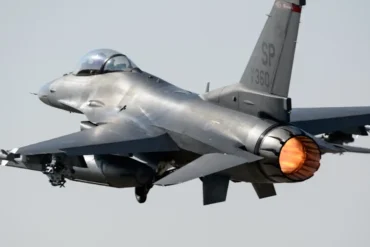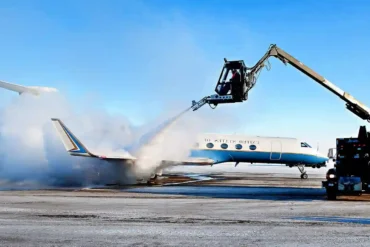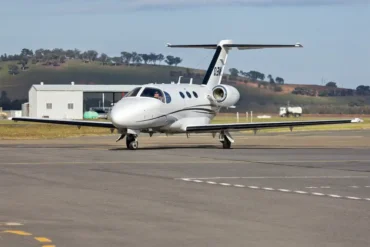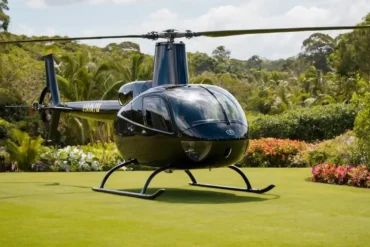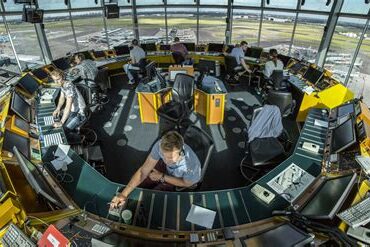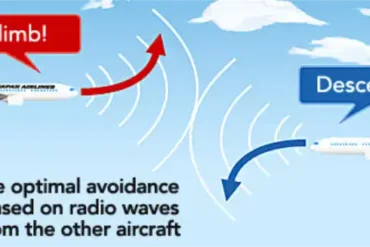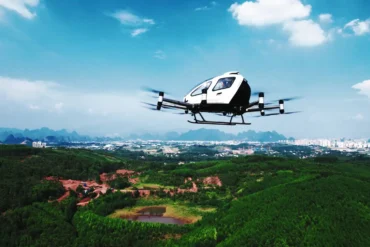Within the aviation and aircraft industries, beyond the realms of piloting and aircraft maintenance, lie several other essential roles. If you find this field intriguing, consider embarking on a career as a flight attendant—a role that centers around ensuring passenger comfort and safety. Understanding the daily responsibilities and prerequisites can help you decide if this career path aligns with your aspirations. In this article, we delve into the specifics of a flight attendant’s role, explore average salaries and job prospects, outline the necessary requirements, and provide insights on how to become a flight attendant. Additionally, we touch upon their work environment and offer an illustrative job description. Keep in mind that salary figures are based on data available at the time of writing and may vary depending on the hiring organization, an individual’s experience, academic background, and geographical location.
What does a flight attendant do?
Flight attendants serve both private and commercial airline companies, ensuring the safety and comfort of passengers. Their responsibilities encompass guiding passengers to their seats, demonstrating the proper use of safety equipment (including seat belts), and providing refreshments and other services. Legally mandated by all airlines, flight attendants play a crucial role in safeguarding passengers during air travel. Additional duties include:
- Attending preflight briefings with the pilots to obtain flight information for each trip
- Inspecting emergency equipment before each flight
- Ensuring the plane’s cabin is clean and well-stocked with food and drinks
- Assisting in lifting heavy luggage into overhead bins and securing them before takeoff
- Ensuring all passengers are prepared for takeoff and landing
- Providing assistance to passengers with special needs, small children, or medical requirements
- Responding to disruptive passengers and monitoring the aircraft for suspicious behavior
- Assisting passengers in locating their seats, understanding safety equipment usage, handling potential fires, and directing evacuations during emergencies
- Reporting safety or medical incidents that occur during a flight
- Familiarizing themselves with company policies and health guidelines for passengers
Salary and job outlook for flight attendants
The national average salary for a flight attendant is approximately $39,321 per year. Earnings can vary based on experience, education, employer, and location. According to the United States Bureau of Labor Statistics (BLS), flight attendant jobs are projected to grow by 21% between 2021 and 2031—a growth rate significantly higher than the average for other occupations. As a result, there may be approximately 18,100 job openings annually.
Flight attendant requirements
To qualify for a flight attendant position, candidates must meet the following criteria:
- Be at least 18 or 21 years old (depending on state or employer regulations)
- Possess a valid passport
- Have at least 20/40 vision
- Successfully pass a drug test and background check
- Fulfill additional requirements, such as passing a medical examination and meeting an airline’s height standards
Education
Flight attendants typically hold at least a high school diploma or GED. While some airlines may prefer candidates with an associate or bachelor’s degree, particularly in fields such as:
- Communication
- Hospitality
- Business
- Tourism
- Public relations
- Nursing
Alternatively, individuals can choose to enroll in flight attendant schools. For those aspiring to work on international flights, foreign language classes can be beneficial.
Training
Many flight attendants gain customer service skills through one to two years of work experience. Once hired, they undergo three to six weeks (and occasionally up to six months) of training provided by the airline. During this training period, flight attendants learn safety and emergency procedures, first aid, flight regulations, and job duties. Practical application of these skills occurs during practice flights. All flight attendants complete this initial training to obtain certification from the Federal Aviation Administration (FAA). Depending on the airline employer, additional job-specific training may be required.
Certifications
Flight attendants must hold certification from one of the following credentials:
FAA Certificate of Demonstrated Proficiency
This certificate, earned through on-the-job training and successful completion of an exam, is mandatory. Flight attendants receive certification for each type of aircraft they work on and continue to receive annual training to maintain certification.
Flight Attendant Certificate Courses
Organizations like Inflight Institute offer certification programs tailored to different types of airlines: charter, regional, national, or international. Partner airlines often require aspiring flight attendants to complete flight attendant certificate courses. These courses cover a wide range of topics, including aviation terminology, safety procedures, and passenger handling. By successfully completing these courses, candidates enhance their qualifications before entering the field.
Skills
Flight attendants typically enjoy working with people and possess strong interpersonal and customer service skills. The allure of traveling to diverse locations compensates for the irregular hours, making this career choice appealing. Aspiring flight attendants can develop essential soft skills, including:
- Attention to Detail: Meticulously monitoring passengers and safety equipment.
- Clear Communication: Confidently delivering safety demonstrations and interacting with passengers and crew. They also exhibit courtesy and active listening.
- Customer Service: Providing hospitality, answering questions, directing passengers to their seats, and assisting with luggage storage. Their friendly and patient demeanor ensures a positive flight experience for passengers.
- Stamina: Handling long hours, challenging passengers, and heavy items like luggage and service carts.
- Efficiency: Swiftly completing preflight tasks to ensure on-time departures.
- Leadership: Taking charge during emergencies and making quick decisions to guide passengers to safety.
How to become a flight attendant
Here’s a step-by-step guide on how to become a flight attendant:
- Obtain a High School Diploma: The minimum educational requirement for flight attendants is a high school diploma or GED.
- Consult with a Career Counselor: Speak with a counselor about your intention to become a flight attendant. They can guide you in selecting coursework that will prepare you for this role.
- Consider Higher Education: While most airlines hire flight attendants without degrees, having an associate or bachelor’s degree—especially in public relations—can enhance your job prospects.
- Develop Customer Service Skills: Gain experience in hospitality or service jobs. Work at restaurants, hotels, or any role that involves interacting with people to hone your customer service skills.
- Master Interview Techniques: Showcase your knowledge of flight attendant duties and emphasize your customer service expertise. Prepare a resume in advance to demonstrate your education and relevant experience.
- Apply for Positions: If you’re over 18 years old and meet health and vision requirements, start applying for flight attendant jobs.
- Undergo Comprehensive Training: If hired by an airline, you’ll undergo weeks or months of rigorous training. Topics covered include first aid, handling challenging situations, evacuation procedures, fire suppression, survival skills, and self-defense.
- Achieve FAA Certification: Successfully pass the FAA’s exam to become certified and legally allowed to work as a flight attendant.
- Begin on Reserve Status: New flight attendants typically start on reserve status. During this period, you’ll be on call to cover for other attendants or handle additional flights. Reserve status usually lasts about a year.
- Advance Your Career: As you gain experience, you’ll earn seniority, allowing you to choose your base, routes, and schedule. You may also take on mentoring, recruitment, training, or management roles, contributing to the overall efficiency of the team.
Work Environment for Flight Attendants
Flight attendants operate in a dynamic environment, serving both part-time and full-time roles across commercial, corporate, regional, and international airlines. Their work hours defy convention, spanning day and night, year-round, including holidays and weekends. Flexibility is key, as they may receive last-minute calls or be on standby. While airlines typically limit daily work to 12 hours, international flights may extend beyond this. The Federal Aviation Administration (FAA) mandates a minimum of nine hours of rest between shifts.
Flight attendants split their time between the skies and the ground. They await flights in airports, sometimes overnight, and spend days away from home. When airborne, they collaborate with fellow crew members within the aircraft cabin. The role demands resilience, as flight attendants handle potential emergencies, navigate air turbulence, and remain on their feet for extended periods.
Flight Attendant Job Description Example
Consider the following sample job description for a flight attendant:
A busy family in Beverly Hills is looking to hire a full-time qualified FAA Part 91 Flight Attendant for their Gulfstream 650.
Responsibilities of this role include greeting passengers, providing refreshments, light food preparation and serving, and attending to the needs of passengers during the flight
The ideal candidate will live within one hour of Van Nuys and be available every weekend in the fall plus summers and school holidays. This person should have excellent serving and presentation skills, and a polished professional demeanor. Also important to the role is knowledge of emergency equipment and procedures.
This is a full-time position with competitive compensation starting at $85K-$105K annually plus full benefits.
Immediate interviews available.
Mahler Private Staffing

